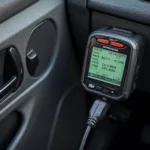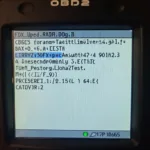OBD2 mileage toners: devices marketed as a quick fix to alter a vehicle’s odometer reading. But do they actually work, and what are the implications of using them? This article delves into the reality of OBD2 mileage toners, exploring the technology behind them, the legal ramifications, and the potential risks involved.
Understanding OBD2 and Mileage Correction
OBD2, or On-Board Diagnostics II, is a standardized system that allows external devices to access a vehicle’s computer system and retrieve data, including diagnostic trouble codes, sensor readings, and mileage information. The idea of an “OBD2 mileage toner” suggests a device that can seamlessly and undetectably alter the mileage stored in a vehicle’s electronic control unit (ECU). However, the reality is far more complex. Modern vehicles often store mileage data in multiple locations within the ECU and sometimes even in other modules like the instrument cluster. Changing the mileage requires specialized tools and knowledge, far beyond the capabilities of a simple plug-and-play device.
How Odometers Work: Then and Now
Older vehicles used mechanical odometers, which were relatively easy to manipulate. However, modern vehicles rely on electronic odometers, which store mileage digitally. This digital storage makes tampering significantly more challenging and leaves electronic traces that can be detected by trained professionals.
The Truth About OBD2 Mileage Toners
While devices advertised as “OBD2 mileage toners” might claim to offer a simple solution for mileage correction, it’s crucial to approach such claims with skepticism. In most cases, these devices are scams. Legitimate mileage correction requires specialized equipment and expertise, and often involves reprogramming or replacing components within the vehicle’s electronic systems. Attempting to use unverified devices can potentially damage your vehicle’s electronics and even render it inoperable.
Why Mileage Tampering is Illegal and Unethical
Tampering with a vehicle’s odometer is illegal in most countries, including the United States. It’s considered fraud because it misrepresents the vehicle’s history and can lead to financial harm for unsuspecting buyers. Rolling back mileage can hide potential mechanical issues that arise with higher mileage, leading to safety concerns.
What to Do if You Suspect Odometer Fraud
If you are considering purchasing a used vehicle and suspect odometer fraud, there are several steps you can take to protect yourself:
- Check the vehicle’s history report: This report can provide information about previous owners, reported accidents, and mileage readings recorded at different times.
- Inspect the vehicle thoroughly: Look for signs of wear and tear that don’t match the reported mileage, such as worn pedals, worn steering wheel, or excessive wear on the driver’s seat.
- Consult a qualified mechanic: A mechanic can inspect the vehicle for potential mechanical problems that may be hidden by a rolled-back odometer.
Protecting Yourself From Mileage Scams
The best way to avoid becoming a victim of mileage fraud is to be informed and cautious. Research the vehicle’s history, inspect it thoroughly, and consult a trusted mechanic before making a purchase.
Conclusion
OBD2 mileage toners, as often advertised, are largely a myth. Tampering with a vehicle’s odometer is illegal and unethical, and attempting to use such devices can lead to significant problems. Understanding how odometers work and being vigilant when purchasing used vehicles is crucial for protecting yourself from fraud. Remember, accurate mileage is essential for assessing a vehicle’s value and potential maintenance needs.
FAQ
- Do OBD2 mileage toners really exist? No, devices marketed as simple plug-and-play OBD2 mileage toners are generally scams.
- Is it legal to change a vehicle’s mileage? No, it’s illegal in most jurisdictions to tamper with a vehicle’s odometer.
- How can I check a vehicle’s mileage history? You can obtain a vehicle history report from various providers, which can reveal recorded mileage readings over time.
- What are the signs of odometer rollback? Inconsistent wear and tear compared to the reported mileage, discrepancies in service records, and digital tampering traces are potential indicators.
- What should I do if I suspect odometer fraud? Report your suspicions to the appropriate authorities and avoid purchasing the vehicle.
- How can I protect myself from mileage scams? Research the vehicle’s history, inspect it thoroughly, and consult a trusted mechanic.
- Can mileage correction be done legally? Yes, in certain circumstances, such as correcting an inaccurate reading after instrument cluster replacement, but it requires proper documentation and adherence to legal procedures.
For further assistance, please contact us via WhatsApp: +1(641)206-8880, Email: [email protected], or visit our office at 789 Elm Street, San Francisco, CA 94102, USA. Our customer support team is available 24/7.


